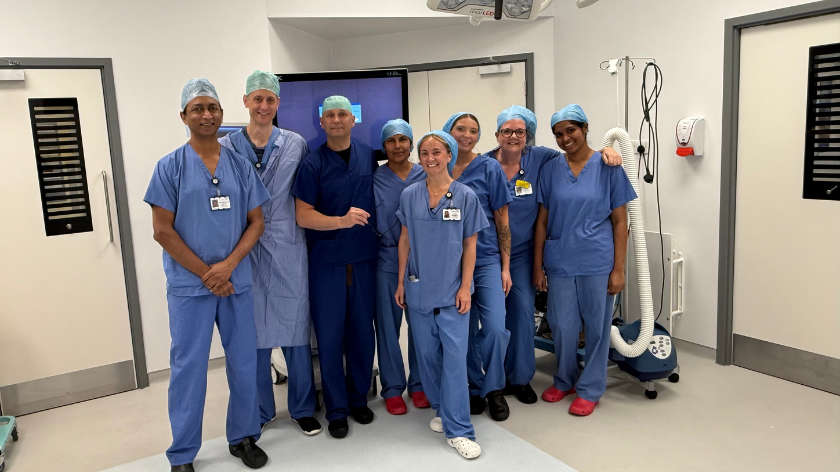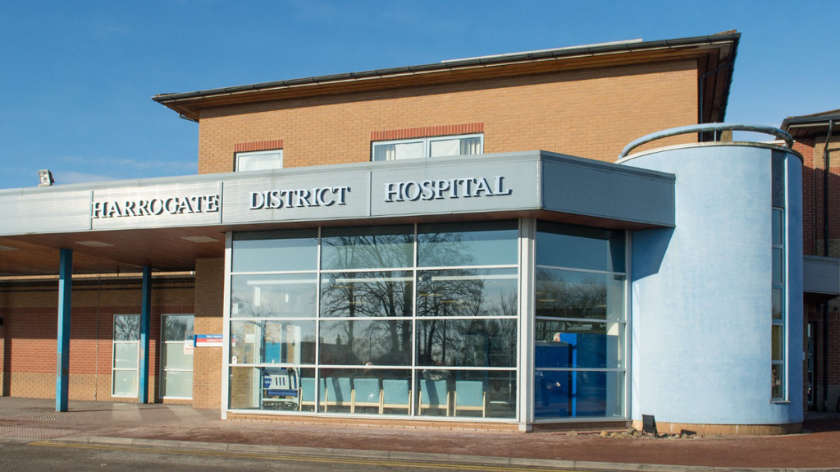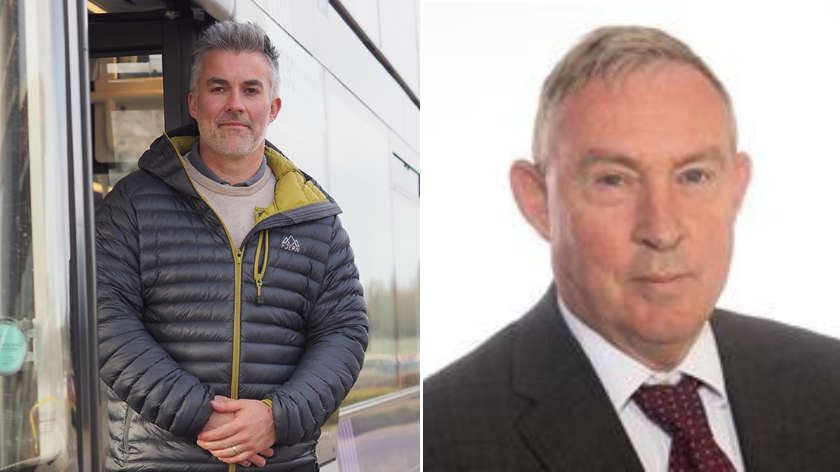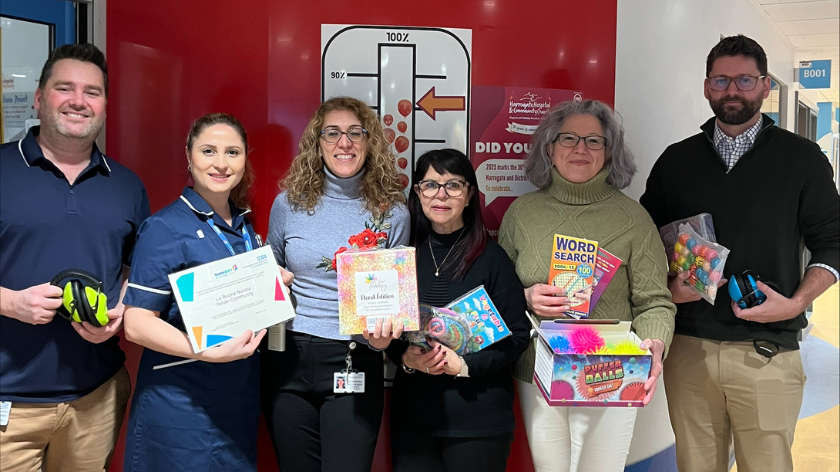
Patients can now have Laparoscopic (keyhole) hysterectomies as day cases thanks to a new service at Harrogate and District NHS Foundation Trust (HDFT).
A hysterectomy is a surgical procedure which removes the womb (uterus), after which pregnancy is no longer possible and menstruation stops.
Hysterectomies are carried out to treat health problems that affect female reproductive system such as heavy periods, long-term pelvic pain, adenomyosis, non-cancerous tumours (fibroids) and cancer.
For a number of years, HDFT has been carrying out total laparoscopic hysterectomies (TLH), a type of keyhole surgery, which is performed under general anaesthetic and usually takes between 1-2 hours.
During the procedure, a small tube containing a tiny video camera (laparoscope) is inserted through a small cut near the belly button. Instruments are then inserted through other small incisions into the abdomen to remove the uterus (and sometimes the fallopian tubes and ovaries).
Until now, patients who have had a TLH have stayed an average one to two days at Harrogate District Hospital following the procedure. However, a new service has been developed allowing for the patient to go home the same day.

As a day–case service, patients are admitted to the theatre recovery unit following surgery where they will stay for around 20 to 30 minutes until they are fully awake. Patients are then returned to the ward, where they are observed through the day (six hours post-operatively).
Once they are able to eat and drink, can pass urine normally and be able to walk around the ward comfortably with oral pain relief, they will be considered for discharge by the surgical and recovery teams if their condition is deemed safe and they are well enough.
The benefits of same-day discharge after surgery include a faster recovery and return to normal daily activities; a reduced risk of complications that can happen from extended hospital stays, such as blood clots; and a quicker return to eating and drinking.
Patients must meet certain criteria to be eligible for same day discharge TLH.
Criteria includes a patient’s body mass index (BMI) being less than 40; no current major medical conditions or past anaesthetic problems that would increase their anaesthetic risks; they have not had past complex abdominal surgery; they can be supported at home for the first 24-48 hours after surgery; and pre-assessment checks do not raise concerns about offering same day discharge.
Suitability will be discussed by the patient’s gynaecologist.
The new service has been developed by Levente Barabási - Surgical Care Practitioner in Gynaecology at HDFT, and represents a significant advancement in delivering enhanced recovery and patient centred care within the Trust.
Levente said:
“It has been a privilege to work on this project, which reflects our unwavering commitment to improving patient outcomes and experiences. Our aim has always been to deliver safe, efficient, and compassionate care, and this initiative stands as a testament to that goal.
“No-one wants to spend longer than they have to in a hospital and there can be some incredible benefits of recovering at home.
"It can lower the risk of some infections, provide an environment where you can have better quality sleep, which helps the body recover; it provides more freedom; and, of course, there is nothing better than a familiar environment surrounded by your creature comforts.
“Discharging patients on the same day also provides our hospital with more available bed space, meaning that we can help more people.
“This is a significant milestone for the Gynaecology service at HDFT, and a true credit to the dedication, collaboration, and excellence of everyone involved.”
Charlotte-Ann Smith, the first patient to benefit from the same day discharge TLH surgery said:
“I have really appreciated the quality of care I have received from admission, all the way through to discharge.
“My recovery is going well and I already feel like a new person after years of problems.
“Being able to return home within hours of major surgery has really helped. I feel that if I had stayed in hospital, it would have prolonged the start of my recovery and it wouldn’t have motivated me to get up and out of bed. Recovery so far has been a lot easier than I ever thought it would be.”



 Pilot dies following aircraft crash near Masham, police confirm
Pilot dies following aircraft crash near Masham, police confirm
 Ripon's Portly Pig to host charity football tournament
Ripon's Portly Pig to host charity football tournament
 Council to review parking charges across North Yorkshire
Council to review parking charges across North Yorkshire
 Free packed lunches at Starbeck café feed families in need
Free packed lunches at Starbeck café feed families in need
 Harrogate dentist recognised at national dental awards
Harrogate dentist recognised at national dental awards
 Knaresborough beeswax candle shop set to close
Knaresborough beeswax candle shop set to close
 Harrogate Town launches new half-time crossbar challenge
Harrogate Town launches new half-time crossbar challenge
 Queen and ABBA tribute acts to headline Harrogate Beer Festival
Queen and ABBA tribute acts to headline Harrogate Beer Festival
 Ripon entrepreneur to appear on Dragon's Den
Ripon entrepreneur to appear on Dragon's Den
 Harrogate figures to be 'jailed' to raise money for Harrogate Theatre
Harrogate figures to be 'jailed' to raise money for Harrogate Theatre
 Harrogate bookshop named as finalist for British Book Awards
Harrogate bookshop named as finalist for British Book Awards
 Council update on operator of Alpamare water park
Council update on operator of Alpamare water park
 Visitor levy would be mayor's decision, says senior councillor
Visitor levy would be mayor's decision, says senior councillor
 Date announced for return of Harrogate dog show
Date announced for return of Harrogate dog show
 Harrogate's Italian community donates sensory kits worth £1,200 to Harrogate Hospital
Harrogate's Italian community donates sensory kits worth £1,200 to Harrogate Hospital
 Man taken to Leeds General infirmary following aircraft crash in Masham
Man taken to Leeds General infirmary following aircraft crash in Masham
 Six arrested following car theft in Harrogate
Six arrested following car theft in Harrogate
 FULL CHAT: Local occupational therapist hosts online masterclass to support new mums
FULL CHAT: Local occupational therapist hosts online masterclass to support new mums
 Harrogate businesses reject new accommodation BID proposal
Harrogate businesses reject new accommodation BID proposal
 New interior showroom to open on Albert Street
New interior showroom to open on Albert Street







